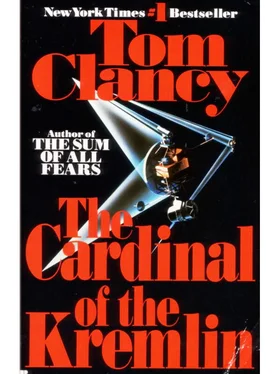Tom Clancy - The Cardinal of the Kremlin
Здесь есть возможность читать онлайн «Tom Clancy - The Cardinal of the Kremlin» весь текст электронной книги совершенно бесплатно (целиком полную версию без сокращений). В некоторых случаях можно слушать аудио, скачать через торрент в формате fb2 и присутствует краткое содержание. Год выпуска: 1988, Жанр: Триллер, на английском языке. Описание произведения, (предисловие) а так же отзывы посетителей доступны на портале библиотеки ЛибКат.
- Название:The Cardinal of the Kremlin
- Автор:
- Жанр:
- Год:1988
- ISBN:нет данных
- Рейтинг книги:3 / 5. Голосов: 1
-
Избранное:Добавить в избранное
- Отзывы:
-
Ваша оценка:
- 60
- 1
- 2
- 3
- 4
- 5
The Cardinal of the Kremlin: краткое содержание, описание и аннотация
Предлагаем к чтению аннотацию, описание, краткое содержание или предисловие (зависит от того, что написал сам автор книги «The Cardinal of the Kremlin»). Если вы не нашли необходимую информацию о книге — напишите в комментариях, мы постараемся отыскать её.
The Cardinal of the Kremlin — читать онлайн бесплатно полную книгу (весь текст) целиком
Ниже представлен текст книги, разбитый по страницам. Система сохранения места последней прочитанной страницы, позволяет с удобством читать онлайн бесплатно книгу «The Cardinal of the Kremlin», без необходимости каждый раз заново искать на чём Вы остановились. Поставьте закладку, и сможете в любой момент перейти на страницу, на которой закончили чтение.
Интервал:
Закладка:
But he couldn't stop now. It had started in Afghanistan and he wondered if it would ever stop.
He'd been able to shut it out at first. A corporal in an ordnance company, he worked with what the Soviet military euphemistically referred to as "counterterrorist devices." These were distributed by air, or most often by Soviet soldiers completing a sweep through a village. Some were the prototypical Russian matryoshka dolls, a bandanaed figure with a roly-poly bottom; or a truck; or a fountain pen. Adults learned fast, but children were cursed both with curiosity and the inability to learn from the mistakes of others. Soon it was learned that children would pick up anything, and the number of doll-bombs distributed was reduced. But one thing remained constant: when picked up, a hundred grams of explosive would go off. His job had been assembling the bombs and teaching the soldiers how to use them properly.
Altunin hadn't thought about it much at first. It had been his job, the orders for which came from on high; Russians are neither inclined by temperament nor conditioned by education to question orders from on high. Besides, it had been a safe, easy job. He hadn't had to carry a rifle and go walking in the bandit country. The only dangers to him had been in the bazaars of Kabul, and he'd always been careful to walk about in groups of five or more. But on one such trip he'd seen a young child – boy or girl, he didn't know – whose right hand was now a claw, and whose mother stared at him and his comrades in a way he would never forget. He'd known the stories, how the Afghan bandits took particular delight in flaying captured Soviet pilots alive, how their women often handled the matter entirely. He'd thought it clear evidence of the barbarism of these primitive people – but a child wasn't primitive. Marxism said that. Take any child, give it proper schooling and leadership, and you'd have a communist for life. Not that child. He remembered it, that cold November day two years ago. The wound was fully healed, and the child had actually been smiling, too young to understand that its disfigurement would last forever. But the mother knew, and knew how and why her child had been punished for being… born. And after that, the safe, easy job hadn't been quite the same. Every time he screwed the explosives section onto the mechanism, he saw a small, pudgy child's hand. He started seeing them in his sleep. Drink, and even an experiment with hashish hadn't driven the images away. Speaking with his fellow technicians hadn't helped – though it had earned him the wrathful attention of his company zampolit . It was a hard thing he had to do, the political officer had explained, but necessary to prevent greater loss of life, you see. Complaining about it would not change matters, unless Corporal Altunin wanted transfer to a rifle company, where he might see for himself why such harsh measures were necessary.
He knew now that he should have taken that offer, and hated himself for the cowardice that had prevented the impulse. Service in a line company might have restored his self-image, might have – might have done a lot of things, Altunin told himself, but he hadn't made the choice and it hadn't made the difference. In the end, all he'd earned for himself was a letter from the zampolit that would travel with him for the rest of his life.
So now he tried to expiate that wrong. He told himself that perhaps he already had – and now, if he were very lucky, he could disappear, and perhaps he could forget the toys that he'd prepared for their evil mission. That was the only positive thought that his mind had room for, this cold, cloudy night.
He walked north, keeping off the dirt sidewalks, staying in shadows, away from the streetlamps. Shift workers coming home from the Moskvich plant made the streets agreeably crowded, but when he arrived at the railyard outside the plant, all the commuting was over. Snow started to fall heavily, reducing visibility to a hundred meters or so, with small globes of flakes around each of the lights over the stationary freight cars. A train seemed to be forming up, probably heading south, he told himself. Switching locomotives were moving back and forth, shunting boxcars from one siding to another. He spent a few minutes huddled by a car to make sure that he knew what was happening. The wind picked up as he watched, and Altunin looked for a better vantage point. There were some boxcars fifty or so meters away, from which he could observe better. One of them had an opened door, and he'd need to inspect the locking mechanism if he wanted to break inside one. He walked over with his head down to shield his face from the wind. The only thing he could hear, other than the crunch of snow under his boots, was the signal whistles of the switch engines. It was a friendly sound, he told himself, the sound that would change his life, perhaps lead the way to something like freedom.
He was surprised to see that there were people in the boxcar. Three of them. Two held cartons of auto parts. The third's hands were empty, until he reached into his pocket and came out with a knife.
Altunin started to say something. He didn't care if they were stealing parts for sale on the black market. He wasn't concerned at all, but before he could speak, the third one leaped down on him. Altunin was stunned when his head struck a steel rail. He was conscious, but couldn't move for a second, too surprised even to be afraid. The third one turned and said something. Altunin couldn't make out the reply, but knew it was sharp and quick. He was still trying to understand what was happening when his assailant turned back and slashed his throat. There wasn't even any pain. He wanted to explain that he wasn't… concerned… didn't care… just wanted to… one of them stood over him, two cartons in his arms, and clearly he was afraid, and Altunin thought this very odd, since he was the one who was dying…
Two hours later, a switch engine couldn't stop in time when its engineer noted an odd, snow-covered shape on the rails. On seeing what he'd run over, he called for the yardmaster.
CHAPTER 13
Councils
Beautiful job," Vatutin commented. "The bastards." They've broken the rule , he said to himself. The rule was unwritten but nevertheless very real: CIA does not kill Soviets in the Soviet Union; RGB does not kill Americans, or even Soviet defectors, in the United States. So far as Vatutin knew, the rule had never been broken by either side – at least not obviously so. The rule made sense: the job of intelligence agencies was to gather intelligence; if KGB and CIA officers spent their time killing people – with the inevitable retaliation and counter-retaliation – the primary job would not get done. And so the business of intelligence was a civilized, predictable business. In third-world countries, different rules applied, of course, but in America and the Soviet Union, the rules were assiduously followed.
Until now, that is – unless I'm supposed to believe that this poor, sad bastard was murdered by auto-parts thieves! Vatutin wondered if CIA might have contracted the job out to a criminal gang – he suspected that the Americans used Soviet criminals for some things too sensitive for their own lily-white hands. That would not be a technical violation of the rules, would it? He wondered if the First Directorate men ever used a similar dodge…
All he knew right now was that the next step in the courier chain was dead at his feet, and with it his only hope of linking the microfilm to the American spy in the Defense Ministry. Vatutin corrected himself: He also knew that he'd have to report this to the Chairman in about six hours. He needed a drink. Vatutin shook his head and looked down at what was left of his suspect. The snow was falling so rapidly that you couldn't see the blood anymore.
Читать дальшеИнтервал:
Закладка:
Похожие книги на «The Cardinal of the Kremlin»
Представляем Вашему вниманию похожие книги на «The Cardinal of the Kremlin» списком для выбора. Мы отобрали схожую по названию и смыслу литературу в надежде предоставить читателям больше вариантов отыскать новые, интересные, ещё непрочитанные произведения.
Обсуждение, отзывы о книге «The Cardinal of the Kremlin» и просто собственные мнения читателей. Оставьте ваши комментарии, напишите, что Вы думаете о произведении, его смысле или главных героях. Укажите что конкретно понравилось, а что нет, и почему Вы так считаете.






![Александр Ирвин - Tom Clancy’s The Division 2. Фальшивый рассвет [litres]](/books/417744/aleksandr-irvin-tom-clancy-s-the-division-2-falsh-thumb.webp)





